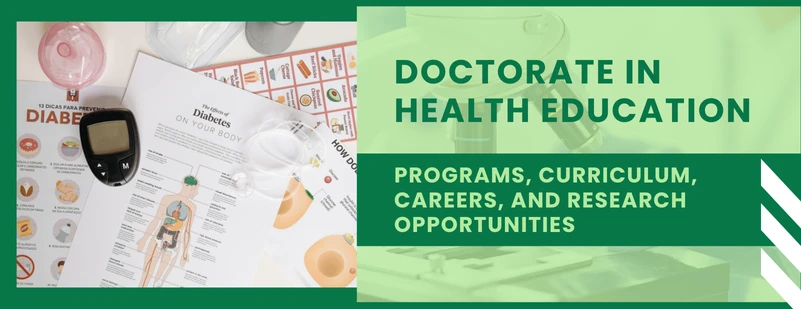Health literacy and preventive care are cornerstones of modern healthcare. As chronic diseases rise and global health challenges become more complex, the need for experts who can design, evaluate, and lead effective health education programs is greater than ever.
A Doctorate in Health Education prepares professionals for leadership, academic, and research roles in public health, community health, healthcare systems, and higher education. If you’re looking to advance into positions where you can influence policy, conduct groundbreaking research, or train the next generation of health educators, this degree can be a game-changer.
This guide explores the doctorate in health education in detail—covering program structure, skills gained, research areas, career opportunities, and the future of the field.
Table of Contents
What is a Doctorate in Health Education?
A Doctorate in Health Education is a terminal degree that focuses on preparing professionals to address public health challenges through education, behavioral change strategies, research, and policy development.
Unlike a master’s degree in health education (MHE or MPH with a health education focus), a doctorate emphasizes:
- Leadership and Administration – Directing community health programs and organizations.
- Advanced Research – Conducting applied and theoretical studies in health promotion.
- Policy Development – Influencing local, national, and global health policies.
- Curriculum Innovation – Designing educational frameworks for schools, universities, and communities.
Graduates are well-equipped to work as health education directors, professors, researchers, or policymakers in healthcare, public health, academia, and nonprofit sectors.
Program Structure and Curriculum
Most doctorate in health education programs take 3–5 years to complete, depending on full-time or part-time study.
| Stage | Details |
|---|---|
| Core Coursework (Year 1–2) | Health behavior theories, public health education, program planning & evaluation |
| Advanced Research Methods | Biostatistics, qualitative/quantitative research, epidemiology, data analytics |
| Specialization Courses | Global health education, digital health literacy, school-based interventions |
| Comprehensive Exams | Assessing mastery of health education theory and practice |
| Dissertation/Capstone | Independent research project solving a real-world health education issue |
| Defense | Oral presentation and defense of dissertation findings |
Some programs also require fieldwork, residencies, or internships in public health organizations, hospitals, or NGOs.
Skills Gained with a Doctorate in Health Education
Graduates of a doctorate in health education gain high-level skills, including:
- Program Development & Evaluation – Designing effective health promotion campaigns.
- Policy Analysis & Advocacy – Influencing healthcare and education policy.
- Community Health Leadership – Leading nonprofit and public health organizations.
- Academic Expertise – Teaching and mentoring future health educators.
- Research & Data Analysis – Using data to evaluate health outcomes and intervention effectiveness.
Research Areas in Health Education
Doctoral students often focus their research on urgent public health issues.
Key Research Themes:
1. Chronic Disease Prevention
- Obesity, diabetes, cardiovascular disease education.
- Behavioral change programs for lifestyle modification.
2. Digital & Health Literacy
- Online platforms for health education.
- mHealth (mobile health) interventions.
3. School & Community Health Education
- Curriculum development for K–12 health education.
- Community-based participatory health promotion.
4. Global Health & Policy
- Health education in low-resource countries.
- Comparative studies of international health systems.
5. Mental Health & Wellness
- Stress management programs.
- Educational interventions to reduce stigma around mental illness.
Sample Dissertation Topics in Health Education
| Research Area | Sample Dissertation Topic |
|---|---|
| Chronic Disease Prevention | Evaluating the effectiveness of nutrition education programs in preventing obesity among adolescents |
| Digital Health Literacy | The role of mobile health apps in promoting medication adherence among patients with hypertension |
| Community Health | Assessing community-based interventions for smoking cessation in rural populations |
| School Health Education | The impact of school-based sexual health education on reducing teen pregnancy rates |
| Global Health | Comparative analysis of HIV prevention education programs in Sub-Saharan Africa and the U.S. |
Career Opportunities with a Doctorate in Health Education
Graduates of a doctorate in health education are qualified for leadership and academic positions in multiple sectors.
| Sector | Career Options |
|---|---|
| Academia & Research | University professor, academic researcher, curriculum developer |
| Healthcare Organizations | Director of patient education, hospital health educator, wellness program manager |
| Public Health Agencies | Policy analyst, community health director, health promotion specialist |
| Nonprofits & NGOs | Global health advocate, program evaluator, NGO leader |
| Consulting & Private Sector | Health communications consultant, corporate wellness strategist |
Salary Outlook
According to the U.S. Bureau of Labor Statistics, health education specialists earn a median salary of $62,000, but with a doctorate, graduates in executive and academic roles often earn $90,000–$150,000+ annually.
Benefits of Pursuing a Doctorate in Health Education
- Career Advancement – Access to leadership, research, and academic positions.
- Policy Impact – Opportunity to shape health education policies at the state or national level.
- Research Contribution – Conduct meaningful studies that address health disparities.
- Global Opportunities – Work with NGOs and global health organizations.
- Financial Rewards – Higher salaries and job security compared to master’s-level health educators.
Comparison with Related Doctoral Degrees
| Degree | Focus Area |
|---|---|
| Doctorate in Health Education | Health promotion, behavioral change, and curriculum development |
| PhD in Public Health (DrPH) | Broad public health leadership, epidemiology, and population health |
| Doctorate in Healthcare Management | Organizational leadership, hospital administration, and healthcare policy |
| Doctorate in Health Sciences (DHSc) | Interdisciplinary research across health professions and clinical practice |
Future Trends in Health Education
Doctoral students and graduates in health education will play a central role in addressing emerging challenges:
- Digital Health & Virtual Learning – Online education platforms and telehealth.
- AI & Data Analytics in Health Promotion – Predictive modeling for health interventions.
- Global Health Education – Cross-border education programs and pandemic preparedness.
- Equity & Inclusion in Health Literacy – Ensuring underserved populations receive effective education.
- Mental Health Awareness Campaigns – Reducing stigma through innovative educational models.
Is a Doctorate in Health Education Worth It?
Yes, if your career goal is to lead, teach, research, or influence policy, a doctorate in health education is a highly valuable investment.
- For Educators: It allows you to teach at universities and shape curriculum development.
- For Policymakers: It equips you to design health policies that promote wellness and prevention.
- For Researchers: It provides tools to conduct meaningful research and publish impactful findings.
Conclusion
A Doctorate in Health Education is more than an academic degree—it’s a pathway to leadership, innovation, and societal impact. Whether you aim to train future educators, influence policy, or conduct research that improves population health, this degree positions you for success in one of the most vital fields of the future.
If you’re passionate about health promotion, disease prevention, and empowering communities through education, this doctorate can help you create lasting change.























